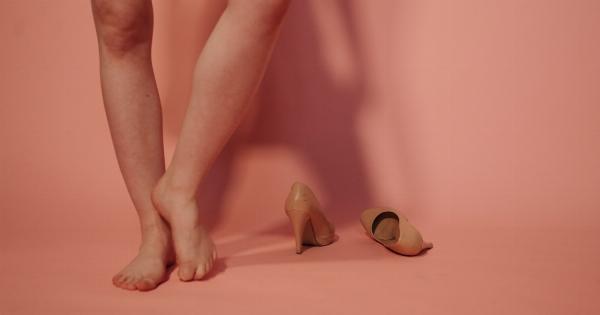Pregnancy is a time of immense joy and anticipation for most women. However, it also comes with various physical changes and discomforts. One of the common challenges faced by pregnant women is choosing the right footwear.
While stylish high heels may be appealing, they can have negative effects on pregnant women’s health and well-being. In this article, we will discuss the potential risks and impacts of wearing high heels during pregnancy.
1. Increased Risk of Falls and Injuries
During pregnancy, a woman’s center of gravity shifts due to weight gain and changes in body shape. This alteration in balance can make it more challenging to maintain stability while walking in high heels.
The elevated height and instability of high heels increase the risk of falls, which can lead to severe injuries, not just for the mother but also for the developing fetus. Falling while wearing high heels can cause fractures or sprains, putting both the mother’s and the baby’s well-being at risk.
2. Strain on Joints and Muscles
High heels are known for their ability to accentuate the calves and make the legs appear longer and more attractive. However, when it comes to pregnant women, high heels can do more harm than good.
Wearing high heels alters the position and alignment of joints, placing excessive stress on the knees, ankles, and lower back. Additionally, the calf muscles are forced into a shortened position, leading to tightness and discomfort. Over time, the strain on joints and muscles can worsen existing pregnancy-related aches and pains, such as lower back pain and sciatica.
3. Increased Risk of Edema (Swelling)
Pregnancy already predisposes women to fluid retention and swelling, and wearing high heels exacerbates this condition.
The elevation and constriction of high heels restrict proper blood circulation and lymphatic flow, leading to an increased risk of edema. Swelling commonly occurs in the feet, ankles, and lower legs during pregnancy, and high heels can intensify this discomfort.
Edema can be not only aesthetically displeasing but also contribute to feelings of heaviness, discomfort, and difficulties with mobility for pregnant women.
4. Back Pain and Postural Changes
Pregnancy brings about numerous changes in a woman’s body, including hormonal shifts, weight gain, and an expanding abdomen. These changes can affect posture and place strain on the lower back.
Wearing high heels during pregnancy exacerbates this strain, as the unnatural positioning of the feet and altered center of gravity further increases stress on the spine. This can lead to lower back pain and discomfort, which is already a common complaint among pregnant women. It is crucial to prioritize comfort and support over fashion during this period to maintain proper posture and reduce the risk of chronic pain.
5. Reduced Stability and Balance
Pregnancy hormones, such as relaxin, loosen the ligaments and joints to prepare the body for childbirth. While this is necessary for the safe delivery of the baby, it also compromises stability and balance.
Wearing high heels during pregnancy further weakens stability as the narrow base and elevated heels make it more challenging to maintain balance. Pregnant women are already prone to balance issues due to the shifting center of gravity, and wearing high heels intensifies this problem.
Reduced stability increases the likelihood of falls and injuries, posing a risk to both the mother and the unborn child.
6. Varicose Veins
Varicose veins are a common condition during pregnancy, characterized by swollen, twisted veins that usually appear in the legs. Hormonal changes and increased blood volume contribute to the development of varicose veins.
However, wearing high heels exacerbates this condition by impeding blood circulation. The constriction caused by high heels hinders the normal flow of blood from the legs back to the heart, leading to blood pooling and the appearance of varicose veins.
This condition can be not only painful but also aesthetically bothersome for pregnant women.
7. Increased Risk of Foot Problems
Pregnancy naturally leads to weight gain, which places extra stress on the feet. Wearing high heels further compounds this stress by adding unnatural pressure on the feet and toes.
High heels force the majority of body weight onto the ball of the foot, increasing the risk of foot problems such as plantar fasciitis, Achilles tendonitis, and bunions. These conditions can be extremely painful and may require medical intervention. Prioritizing comfortable and supportive footwear, such as flats or low-heeled shoes, is crucial to minimize foot-related discomfort and potential long-term issues.
8. Muscle Imbalances and Weakened Pelvic Floor
Wearing high heels for extended periods can contribute to muscle imbalances in the lower body, including the pelvic floor muscles. These muscles play a vital role in supporting the bladder, uterus, and bowel.
Wearing high heels regularly can lead to weakness and dysfunction of the pelvic floor muscles, which may result in urinary incontinence and other pelvic floor disorders. These issues can persist even after pregnancy and childbirth, highlighting the importance of avoiding high heels during this crucial period.
9. Increased discomfort and fatigue
Pregnancy already brings its fair share of discomfort and fatigue, and wearing high heels can amplify these sensations.
The structural changes in the body and the additional weight make it more challenging to tolerate the strain and discomfort caused by high heels. Lengthy periods of standing or walking in high heels can put excessive pressure on the feet and exacerbate pregnancy-related exhaustion.
Prioritizing comfort and choosing supportive footwear can help alleviate the overall discomfort and minimize fatigue levels.
10. Negative Psychological Impact
Lastly, the negative impacts of wearing high heels during pregnancy are not limited to physical discomfort alone. Pregnancy is a vulnerable and emotionally charged time for many women, and self-esteem and body image issues can arise.
Wearing high heels might seem like an attempt to maintain a pre-pregnancy appearance or boost self-confidence. However, if the discomfort becomes overwhelming or if falls or injuries occur, it can have a severe psychological impact.
It is essential for pregnant women to prioritize their comfort, safety, and well-being above the pressures of societal beauty standards.































